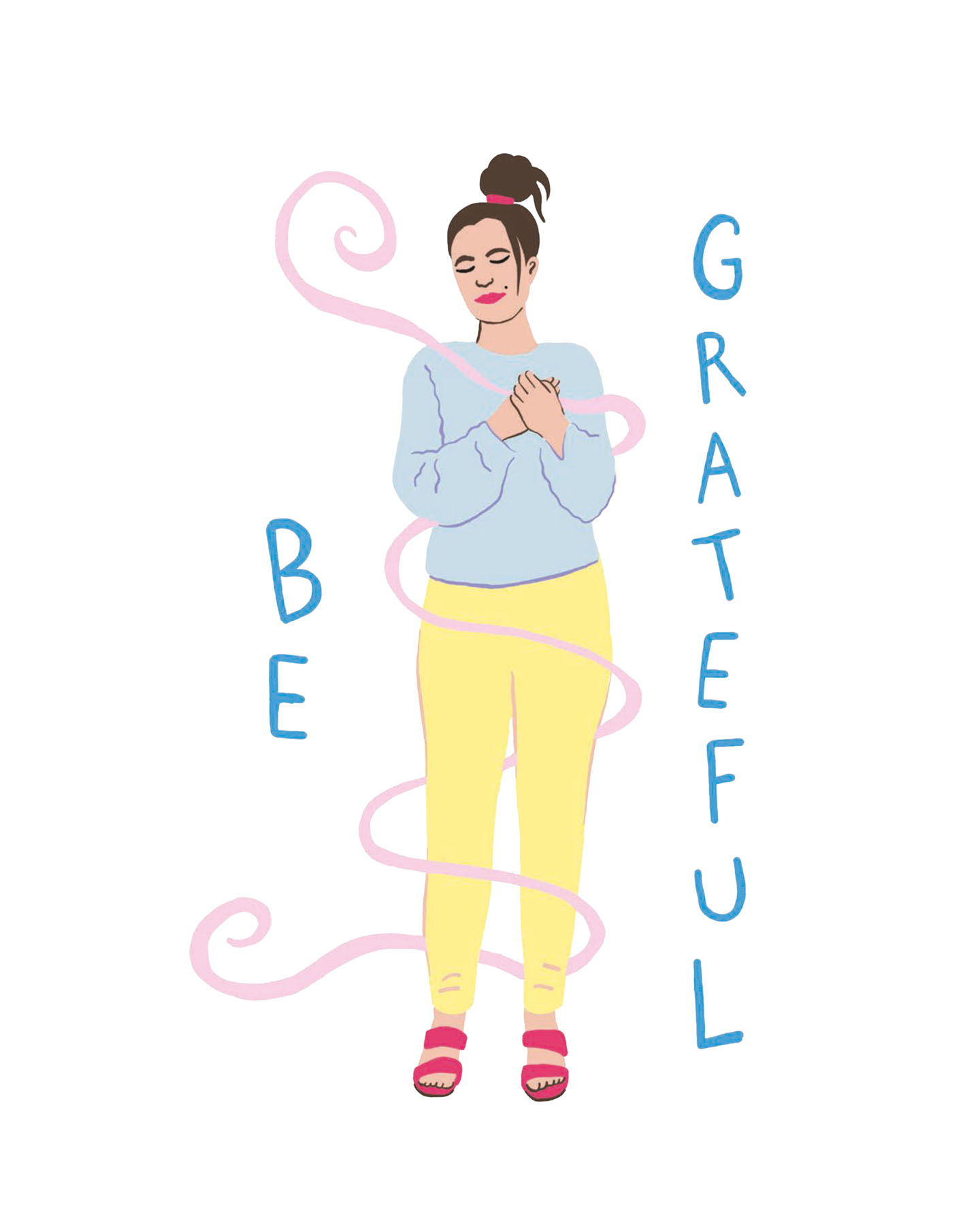
CHAPTER FIFTEEN
Be Grateful
Year-Round Thanksgiving
There is one emotion that has transformed my life: gratitude. As I’ve worked on feeling grateful more often, it’s changed my entire outlook. I’ve gone from paying attention to negative things to seeing the positive in almost everything. A lot has been written about the magic of this emotion.
Why is gratitude so powerful? To find out, I spoke with Sonja Lyubomirsky, a research psychologist, gratitude expert, and the bestselling author of The How of Happiness. Dr. Lyubomirsky told me that gratitude is powerful because it changes the way we think about our lives. When we focus on what we’re thankful for, it removes the need for more. Instead of wishing our lives were different, gratitude makes us feel content and lets us appreciate what’s already here. No matter how hard things are, every life—and every day—has things to appreciate. We can be grateful for the simplest things, like the strong roof over our heads or the blossoming tree outside the window.
Gratitude is also an incredible antidote to comparison. Comparison is a toxic habit that seems to be wired into every human brain. Once, I unconsciously compared my shoes to a classmate’s new pair, my phone to a friend’s new one, and my math-test grade with a peer’s—all in less than a minute.
We always end up feeling bad when we compare ourselves or what we have to others. Gratitude offers a way out of that trap. It trains our minds to focus on things for their own sake, rather than how they stack up against others. We can be grateful for the air we breathe, the food we eat, the people who help us—without comparing them to anything else.
The Gratitude Journal
I’ve always been, let’s just say, extremely tuned to other people’s emotions. When I was little, I would lie awake every night, often in tears. I would get caught up thinking about all the people I knew and all the problems they were going through. It left me sad and hopeless. So I tried an experiment: I started writing down what I was grateful for, every single night, right before bed. I fell asleep a lot faster.
My gratitude journal also boosted how I felt during the day. I began focusing on the beauty in everything and everyone. Peachy clouds in the evening. A teacher who helped me solve a problem. The morning breeze. The troubling things didn’t seem so dire. Because the journaling had such a dramatic effect on my perspective and mood, I’ve been doing it every night since!
There are many different ways to keep a gratitude journal. I encourage you to try out different ones to see what resonates with you. Here’s how to get started:
1. Get a journal and pen you love. This is important! I like writing in simple hardcover lined books. Some prefer a guided notebook, such as the Five-Minute Journal, which is more structured.
2. Write every morning or every night. Some people do it first thing in the morning because it gets their day off to a positive start. I write in my journal at night, right before turning off the light, because it gets me into a calm state before sleep. Or you can do both.
3. List at least three things you’re grateful for. It can be anything you appreciate—a backpack that carries all your books, the janitor at school or work who keeps the rooms clean, or your loved one for cooking a meal.
4. Bonus: Write down things you appreciate about yourself. It can be something you did that day or a trait you’re proud of, such as “I’m grateful that I’m such a loyal friend.” This conditions our minds to focus on our own inner beauty, and it will help us talk kindly to ourselves.

Start by writing in your journal every day for two weeks. See how you feel. Once you’ve gotten in the groove, it won’t seem like a chore. It may even become something you look forward to!
If journaling isn’t your jam, here are some other ways to express gratitude:
 Write a thankful letter to a loved one. (You don’t have to send it.)
Write a thankful letter to a loved one. (You don’t have to send it.)
 Keep a running list with you of things you feel thankful for. Add to it whenever you want.
Keep a running list with you of things you feel thankful for. Add to it whenever you want.
 Create a collage of images that make you smile.
Create a collage of images that make you smile.
 Call up someone you haven’t seen in a while and express your appreciation for them. (This one is always amazing!)
Call up someone you haven’t seen in a while and express your appreciation for them. (This one is always amazing!)
Hear Her
As this book goes to press, we’re on lockdown with a pandemic and there are protests for justice all around the world. I asked a dozen females what they’re grateful for right now. Here’s what they said:
Q&A
Q: Some days are just really bad. How do I find things to be grateful for in those times?
A: You don’t have to limit your gratitude to “good” things. You can be grateful for a frustrating or even scary experience. Every lousy thing that happens has some benefit. It might teach us a valuable lesson, help us grow, or lead to an unexpected silver lining.
Once I wrote down that I was thankful for failing my driving test! Right after the test I was anything but grateful. I was frustrated and humiliated, especially after months of practicing and obsessing over the rules of the road. I cried for an hour. (Okay, more like two.) But by bedtime I had calmed down. I came to realize that it’s okay to fail, that life always goes on. I was grateful for my failed test teaching me that. Another unexpected bonus of failing my driving test was that I had the opportunity to practice driving a lot more. I got really good at left turns at a four-way stop. The second try was a breeze!